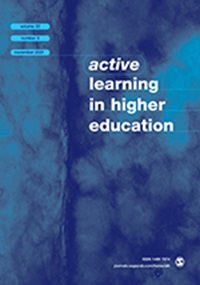基于场所的协作学习中社会共享规则、学术情绪和产品性能的变化
IF 3.2
1区 教育学
Q1 EDUCATION & EDUCATIONAL RESEARCH
引用次数: 0
摘要
教师对学习者的社会共享学习规律(SSRL)过程的了解,包括任务分析、计划、阐述和监控,可以帮助教师在学生在合作学习中遇到困难时进行干预。学生的学业情绪对其学习动机、认知和成绩有重要影响。本研究调查了高、中、低年级学生在参观教育技术中心并共同设计学习环境后,SSRL、学术情绪和产品表现的变化。我们招收了36名教育技术专业的大三学生。使用在线聊天工具记录在线小组讨论,并在此聊天数据上使用启发式挖掘算法来确定SSRL过程。参与者被要求对自己的专业发表意见,这些反馈被用来获得学术情感信息。此外,还采用了评分法来衡量参与者的产品性能。研究发现,高水平组表现出所有四个SSRL阶段,并表现出积极的情绪,激活情绪比停用情绪更常见。SSRL被发现与学习成绩有关;更高的学习成绩与更标准化的SSRL过程相关。此外,参与者的学习成绩越高,参与者就越频繁地产生积极的学术情绪。总体而言,高水平组的学习者更重视协作学习任务。本文章由计算机程序翻译,如有差异,请以英文原文为准。
Changes in the socially shared regulation, academic emotions, and product performance in venue-based collaborative learning
Teachers’ knowledge of the socially shared regulation of learning (SSRL) process of learners, which consists of the task analysis, planning, elaboration, and monitoring, can help teachers intervene when students face difficulties during the collaborative learning. Students’ academic emotions have major effects on their learning motivation, cognition, and performance. This study investigated the changes in SSRL, academic emotions, and product performance of high-, medium-, and low-level groups students after they visited an educational technology center and collaboratively designed a learning environment. We recruited 36 juniors majoring in educational technology. Online group discussions were recorded using online chat tools, and a heuristic mining algorithm was employed on this chat data to determine SSRL processes. The participants were asked to express opinions on their major, and this feedback was used to obtain academic emotion information. Additionally, a scoring was employed to measure the participants’ product performance. The high-level group was discovered to exhibit all four SSRL phases and exhibit positive emotions, with activating emotions more common than deactivating emotions. SSRL was discovered to be related to academic performance; higher academic performance correlated with a more standardized SSRL process. Additionally, the higher a participants’ academic performance, the more frequently the participant had positive academic emotions. Overall, the learners in the high-level group paid more attention to the collaborative learning task.
求助全文
通过发布文献求助,成功后即可免费获取论文全文。
去求助
来源期刊

Active Learning in Higher Education
EDUCATION & EDUCATIONAL RESEARCH-
CiteScore
13.20
自引率
12.00%
发文量
31
期刊介绍:
Active Learning in Higher Education is an international, refereed publication for all those who teach and support learning in higher education (HE) and those who undertake or use research into effective learning, teaching and assessment in universities and colleges. The journal is devoted to publishing accounts of research covering all aspects of learning and teaching concerning adults in higher education. Non-discipline specific and non-context/country specific in nature, it comprises accounts of research across all areas of the curriculum; accounts which are relevant to faculty and others involved in learning and teaching in all disciplines, in all countries.
 求助内容:
求助内容: 应助结果提醒方式:
应助结果提醒方式:


